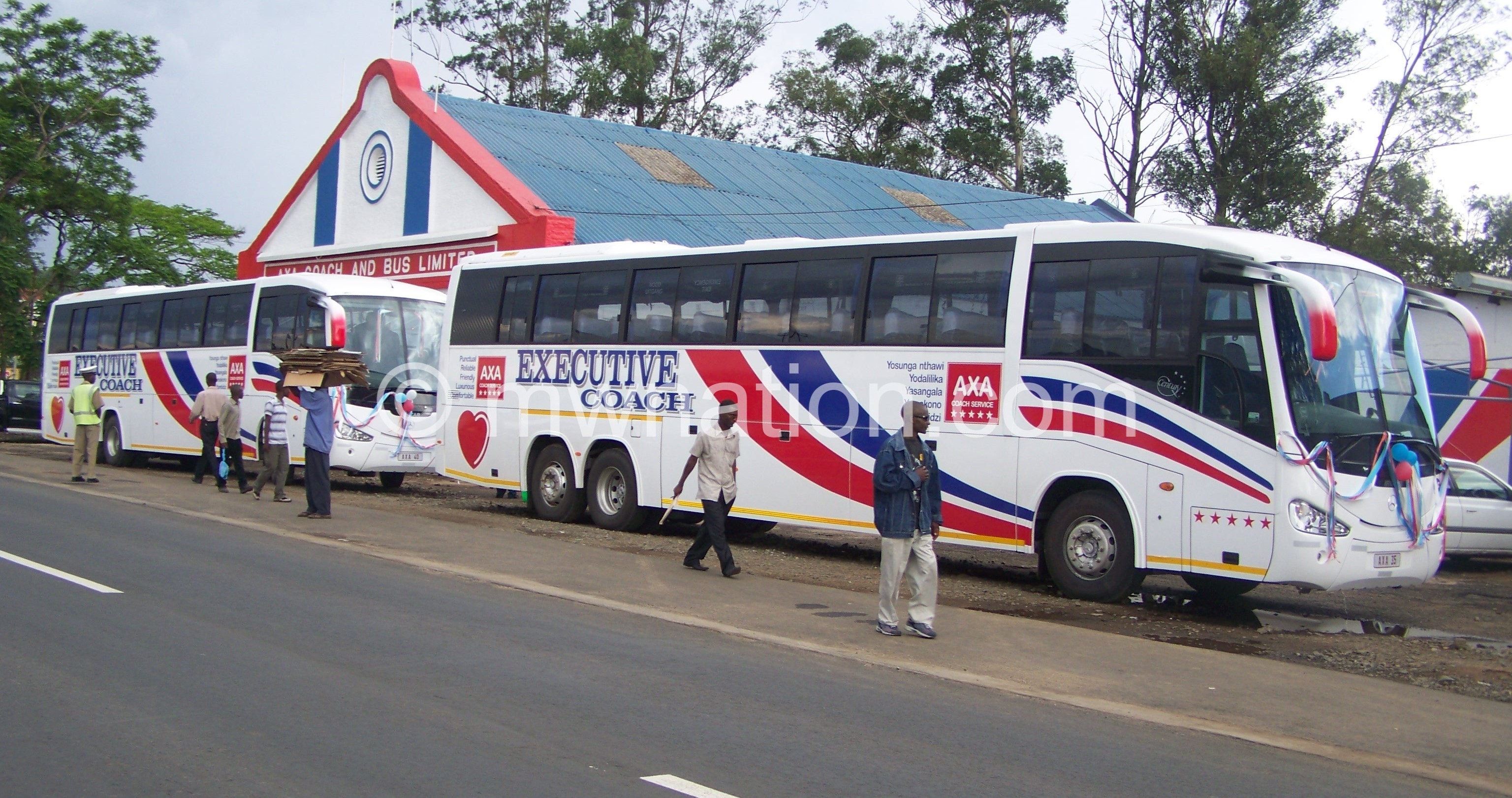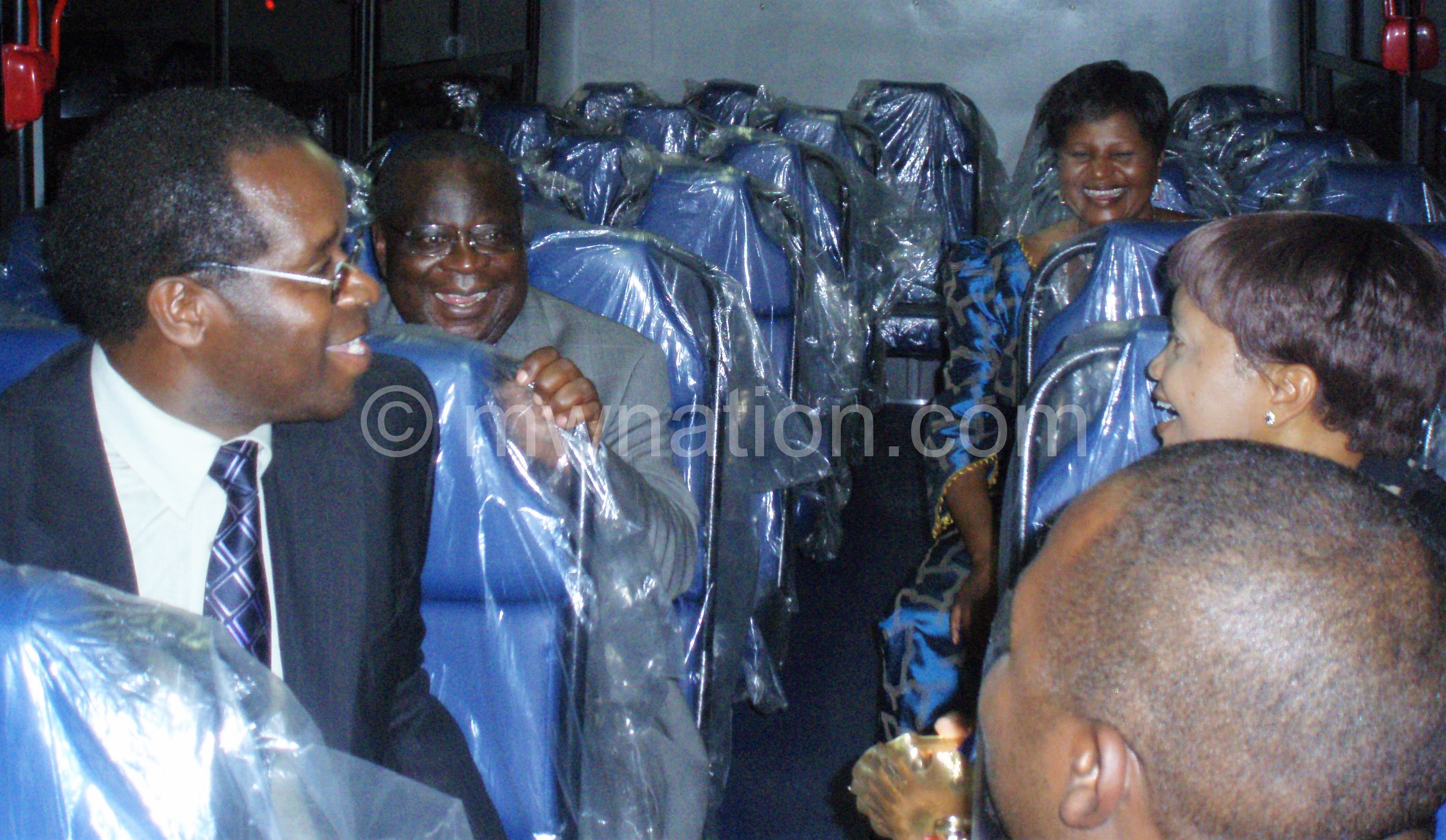Axa bus trip from mandasi sales
Axa Bus Company observes its 10th anniversary this week. Its rise mirrors its founder’s tale of triumph over adversity and belief that tough times make a business mind sharper. JAMES CHAVULA writes.
In a multi-storey Agma House in Maselema, a semi-industrial suburb of Blantyre, two Peoples Progressive Movement (PPM) flags and a glass souvenir from Yutong coach-makers adorn the desk of enigmatic entrepreneur Mark Katsonga.

Forget his party. His Axa Bus Company has been growing steadily since the first three buses took to the road on November 16 2006.
“The past decade hasn’t been easy, but tough times make you sharper. We now have the largest fleet in the country. We go to places nobody thought were possible. Actually, we move more people than any player in any mode of transport, including water air and rail. We beat our competitors hands down,” he says.
At Axa, these are not just bragging rights. They reflect an enduring business culture which started with a constrained pupil selling flitters at Ligowi Primary School in the hills of Neno.

“I have been doing business for over 40 years. When I was in Standard Three, I was selling zitumbuwa and mandasi. Not many pupils do that,” a soft voice blares from the past.
The little Mark had to do it although his father, Chester Katsonga, was a rich founder of Christian Democratic Party (CDP), which was later banned during one-party rule. Founding president Hastings Kamuzu Banda would later dispossess Katsonga Senior of his business Empire comprising Chester clubs in Zomba, Blantyre and Lilongwe as well as Chester City Lodge (now Lingadzi Inn).
Despite Chester’s business success, the boy happily endured a tough boyhood as his mother Alesi Zimpita sold homemade distils and brews for subsistence.
“I learned doing business while young,” Katsonga says.
He vended tangerines and oranges from Mwanza when he was a police detective in Blantyre, a business that reportedly led to his perceived demotion to general duties.
It did not kill his dream.
The Axa supremo was running Golden Egg poultry farm in Mwanza when he imported the first fleet launched with massive hooting at Ginnery Corner.
That fleet keeps expanding.
Katsonga speaks of “a phenomenal growth” to 40 buses in just one and a half years. So far, Axa has imported 74 buses with a few written off or down.
The fleet virtually marks the transformation of the passenger transportation industry from a time-honoured State monopoly to a business opportunity for private entrepreneurs.
When the initial buses were speeding between Blantyre and Mzuzu, the roads of Malawi were a purview of the liquidated State-run Shire Bus Lines with negligible competition and frequent breakdowns.
Then, private traders mostly owned accident-prone minibuses often blamed for aggravation of road carnage in the country.
The picture has changed, with Axa marketing itself as reliable, punctual and comfortable.
Katsonga tells Business Review that start of the company which reshaped travel the business was actually coincidental.
He explains: “I went to Holland to buy poultry equipment when I spotted a bus in a shop. I didn’t understand what it was doing in a shop that stocks poultry accessories. So I asked the proprietor and we got talking. When they heard that Malawi’s bus industry was still government-denominated, they urged me to venture into this business.”
He might not have bought the bus, but the talk persuaded him to study the market, develop a business plan and approach banks.
He remembers “nearly all big banks” did not reply to his loan applications as Shire’s fall somewhat portrayed bus business as risky. The banks reportedly called back after the success of the trio financed by the then State-owned Malawi Savings Bank (MSB).
“The banks that seemed reluctant started making big offers when they saw the phenomenal start. In 18 months, the fleet grew from just three buses to 40, but this growth had to be managed,” Katsonga recalls.
However, management gaps in an industry formerly dominated by expatriates would soon batter the company when the PPM president prioritised his duty as member of Parliament in Neno Central (2004-09).
He says: “The bus line almost collapsed when I got involved in politics. I didn’t have an eye on the business. I was spending weeks attending to my constituency,” he says.
He has admittedly started doing business differently. “Now I spend more time attending to business affairs, while keeping an eye on politics,” he explains.
He has since unbundled Axa, selling commuter buses and half of the shares of Deluxe and special coaches to top managers. But he remains “very greedy” with executive coaches, which serves elite travellers. He terms it the flagship brand.
Market segmentation has helped Axa become a single most important bus line with services tailor-made for users’ convenience.
The company has reportedly State deception having been “tricked to release business secrets” when government relinquished Shire.
Axa tendered to take over.
But Katsonga says: “Government called us to a number of meetings to appreciate how the industry works, but it ended up gaining undue access to our business concept on which they built the National Bus Company [NBC].”
This did not only leave Axa competing with a company it helped found. It had to pay huge costs to access bus depots and garages as NBC inherited most facilities from Shire.
Now Axa, which employs nearly 200 Malawians, rents and owns exclusive facilities in major towns. It also owns a mail delivery service.
Some may think Katsonga inherited a fortune.
But he retorts: “Some inherit wealth from their parents, but I inherited nothing. My dad died poor.”
In his spacious office, the bold businessperson briefly stammers as he recounts his exodus from Neno where Kamuzu’s reportedly found poor people walking “literally naked.”
He narrates: “My father lost everything with a stroke of a pen when Kamuzu ordered the seizure of his businesses because no other party was acceptable.”
“This affected his health. I was working at Lever Brothers at that time and his health deteriorated. He was traumatised and died of multiple organ failure at Mlambe Hospital in Blantyre.”
The political tycoon ironically died depending on a son he once abandoned.
Katsonga says: “My mother raised me singlehandedly by making mandasi and distilling kachasu in the village?”
He pauses, contending with memories to forget.
“This is story,” he says, “my mother was married previously, but her husband vanished to Zimbabwe for over 10 years. Then, she met my father. But they were not married legally because her parents could not allow her to remarry while her husband was still alive.”
Katsonga only reunited with his father when he was in secondary school, walking almost seven kilometres to get to a Malawi College of Distance Education (MCDE) centre in Neno.
A handwritten letter to his father, which we have seen, evokes struggles of a young pupil seeking just a better learning environment and shorter walks to school.
In a typewritten reply, his father promises to finally take him to into his home in Zomba where better schools were within reach.
However, he ended up buying a bicycle so that the little Mark could travel to school like his well-off peers.
The former policeman later worked as a van marketer at Southern Bottlers, travelling to remote parts before he studied marketing in Zimbabwe.
Upon his return, he worked with several companies, including Unilever and Import and Export, but quickly left white-collar jobs to pursue his dreams.
His early years perfectly shatter and demystify the myths of an easy childhood.
“It hasn’t been an easy road,” he says. “The only thing I inherited from my father is his blood, the will to ventilate into business. Axa has risen from something nobody thought was possible to an important player in the transport sector, but it was not rosy.”






Inspired. Others say, motivated. All the best.